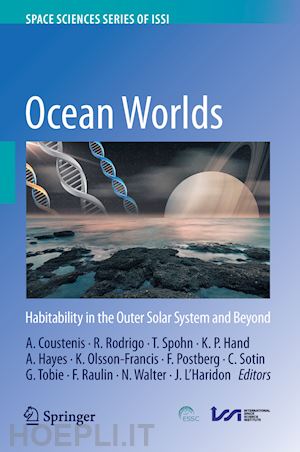Athena Coustenis studied Physics and Astrophysics at Pierre et Marie Curie Paris University and English Literature at La Sorbonne, but she managed to get two Masters and only one PhD. She is currently Director of Research with the French Center for Scientific Research based at Paris Observatory in Meudon, specializing in Planetology. She is currently the President of the European Space Sciences Committee, of the European Space Agency’s Human Exploration and Science Advisory Committee, of the COSPAR Panel on Planetary Protection and of the Evaluation Science committee of the French National Center for Space Studies. She is a member of several other international advisory bodies, in particular of ESA and NASA. She has published more than 230 scientific papers, written 3 books and several chapters and she has given more than 350 presentations.
Rafael Rodrigo (PhD at the University of Granada in 1979) has been Director of the Institute of Astrophysics of Andalusia (1990-2004), where he was directly involved in the direction of many projects on Solar System Exploration. He has been the President of the Spanish National Research Council (CSIC) (2008-2012). He has been or is involved in many space missions (Rosetta, Cassini-Huygens, Mars Express, Bepi-Colombo, JUICE). He is currently a Research Professor at the Centro de Astrobiologia (CSIC), Madrid, and former Executive Director of the International Space Science Institute in Bern, Switzerland (2012-2018). Presently he is General Secretary for Research at the Spanish Ministry of Science and Innovation. He is the author or co-author of more than 300 scientific publications.
Tilman Spohn is the executive Director of the International Space Science Institute in Bern, Switzerland. Before, he was director of the DLR Institute of Planetary Research in Berlin/Germany and a Professor of Planetology at the Westfälische Wilhelms-Universität Münster/Germany. He specializes in the thermodynamics of planetary interiors using modelling and space instrumentation, habitability of planets and the role of life in their geological evolution. He is the principal investigator of the Heat Flow and Physical Properties Package on the NASA InSight mission to Mars and was the principal investigator of the MUPUS package on the Rosetta lander Philae. He is a full member of the Academy of Astronautics and of Academia Europaea, a fellow of the American Geophysical Union and recipient of the European Geophysical Union Runcorn-Florensky Medal.
Dr. Kevin P. Hand is a planetary scientist and astrobiologist at NASA’s Jet Propulsion Laboratory, where he directs the Ocean Worlds Lab. His research focuses on the origin, evolution and distribution of life in the solar system with an emphasis on moons of the outer solar system that likely harbor liquid water oceans. He is the Pre-Project Scientist for NASA’s Europa Lander mission concept and was Co-Chair of the 2016 Europa Lander Science Definition Team. From 2011-2016 Hand served as Deputy Chief Scientist for Solar System Exploration at JPL. His fieldwork has brought him to Antarctica, the Arctic, the depths of Earth’s ocean, the glaciers of Kilimanjaro and Mt. Kenya, and the desert of Namibia.
Alexander Hayes is an Associate Professor of Astronomy at Cornell University and Director of the Cornell Center for Astrophysics and Planetary Science. His flight project experience includes NASA’s Cassini, MER, MSL, Mars2020, Europa Clipper, and Dragonfly missions. Prof. Hayes is the recipient of the Zeldovich Medal from COSPAR, the Ronald Greeley Early Career Award from AGU, the Young Procter Prize from Sigma Xi, and Extraordinary Young Scientist recognition from the World Economic Forum. Hayes sits on the COPAR Panel for Planetary Protection and the U.S. National Academies Committee for Astrobiology and Planetary Science. He earned an M.Eng in Applied Physics from Cornell University and a Ph.D. in Planetary Science from the California Institute of Technology.
Dr Karen Olsson-Francis is the Director of AstrobiologyOU at the Open University, UK. Her team investigates the scientific, governance and ethical implications of space exploration. Her background is in microbiology of extreme environments, she is particularly interested in unique biosignatures that can be used as evidence of life. She has been involved in a number of astrobiology experiments onboard the International Space Station, which involved studying the effect of simulated Mars, icy moon and low Earth conditions on microbial and biosignature survival. She is also the UK representative on the COSPAR Planetary Protection Panel and was involved in writing a white paper on planetary protection of the outer Solar System.
Frank Postberg is a planetary scientist leading a research group at the Institute of Geological Sci











